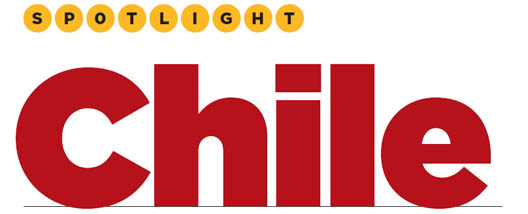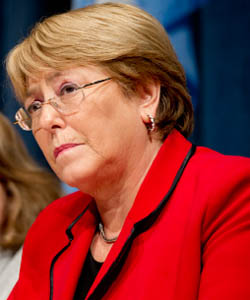
Will Chile ratify a new constitution during the second Bachelet presidency?
This months’ Spotlight explores three scenarios.
President Michelle Bachelet of the Socialist Party-led New Majority coalition took office for her second four-year term on March 11. She has proposed a broad agenda of educational, electoral, and other constitutional reforms. Bachelet is also seeking to further enshrine the rights of women and indigenous people, among other ideas.
![]() Download PDF
Download PDF

Though all these modifications to the existing political system could be addressed through changes to the existing constitution, Bachelet, responding to popular demands, has voiced the need for a new constitution entirely. Originally approved in a 1980 plebiscite during the rule of General Augusto Pinochet, and therefore questioned for its legitimacy, Bachelet has called for “a constitution born in democracy,” saying “the one we have now is illegitimate.”
Will Bachelet get the fresh start she seeks? Or will opposition backlash and internal divisions bring it all to a standstill?
Scenario 1: NO, BUT…Changes are made to the constitution on issues such as supermajority votes, electoral representation, and education but there is not an entirely new constitution.
Bachelet has called for “a constitution born in democracy” saying “the one we have now is illegitimate.” |
National frustration over the representation laws and four-sevenths supermajority requirements for certain legislation, coupled with the intensity of the student lobby for education reform, means that Chile is all but guaranteed to see change. If Bachelet successfully navigates congress, where her coalition controls the majority of seats, many of the changes she campaigned for are likely to come to fruition. Each of these issues can be addressed through amendments and legislation without creating a new constitution entirely.
Her priorities within education reform—a top issue in Chile since student protests began nearly three years ago—are to expand the number of free public nursery schools, ensure quality education at all state-supported primary and secondary schools, and make university education free except for the 30 percent of Chileans deemed high income. She also has called for the end of for-profit education. Changes would be paid for through a possible increase in corporate taxes.
Though congressional representation is not technically a constitutional one, it is directly tied to the constitutionally binding supermajority laws. Currently, each district has two representatives, one from the party with the highest number of votes and the other from the runner-up. This prevents a clear electoral majority from translating into a clear parliamentary victory and makes it extremely difficult to obtain the necessary supermajority required to pass key legislation. Bachelet aims to change both these systems to make congressional representation more proportionate to the electorate and eliminate the four-sevenths majority needed for changing important legislation. This will likely be first on the agenda due to the relative support across party lines.
Education reform is sure to be a contentious issue: Well-organized and highly-vocal student leaders are a powerful political force and several are now in congress. They back Bachelet—and have joined her coalition—because of her promises to make quality education universally accessible. Still, the student activists can quickly make life difficult for the president if they sense a backtracking on campaign promises. At the same time, the opposition is likely to balk at the cost of sustaining free, quality education.
Scenario 2: YES. Bachelet assembles a group of experts to draft a new constitution, which is passed by congress and approved in a nationwide popular referendum.
Potential Constitutional ChangesEnd the four-sevenths supermajority requirement to pass select legislation. Reduce the powers of the constitutional court. Incorporate access to equal quality education as a right. Include women’s and indigenous rights. Adjust the presidential term. |
Much of the discussion around a new constitution has centered on how Bachelet intends to draft, put forth, and ratify such a document. There is currently no legal framework for assembling a constituent assembly (or, constitutional assembly). Chileans are reluctant to rely on congress to create a new constitution because of widespread discontent with the binomial electoral system. The power of minority parties means that congressional priorities are seen as not necessarily reflecting the will of the majority. Until such imbalance is remedied, many Chileans will be unenthusiastic about congress’ role in the creation of a new constitution.
One option for writing a new constitution is an inclusive process by which the new document would be drafted by a body of experts. This would then be passed by congress, followed by a referendum to be voted upon by the people of Chile. While the current constitution does not establish this or any framework for creating a new constitution, this process would allow for a document that ultimately includes both government and the people. Though the president has called for specific constitutional changes (see box), the new document may ultimately look very similar to the existing constitution. The Chilean constitution, in fact, has been amended numerous times since 1980. The main difference would be to free Chile’s national charter from its Pinochet-era tainted origins. Proponents of a new constitution argue that the tone of the current document favors the political minority to stifle democratic change and that fixes at the margins will not be sufficient to foster greater equality
Scenario 3: NO. Opposition backlash and internal divides within Bachelet’s coalition result in no changes.
Student activists back Bachelet because of her promises to make quality education universally accessible. |
Bachelet has formed a notably diverse congressional coalition, which, if it holds together, should empower her to be successful in pushing through reform. Conversely, should alignments crumble, the president could be looking at battling her own allies in addition to the declared opposition. This may force Bachelet to look for new allies among members of the center-right opposition and to then strike a middle-of-the-road approach.
Most student leaders from the protest movement are now members of her congressional coalition. Their mission is to have education inscribed in the constitution as an enumerated right to ensure universal access. Should they feel that Bachelet is not fulfilling this campaign promise the student leaders are the most likely faction to vocalize their dissatisfaction and reignite the protests that bedeviled the administration of Bachelet’s predecessor.
The Communist Party and Christian Democrats, both presently part of the president’s coalition, have clashed in recent weeks over how Chile should respond to the crisis in Venezuela. Though not directly tied to constitutional issues, such internal divide could be deeply damaging to Bachelet’s overall reform efforts.
